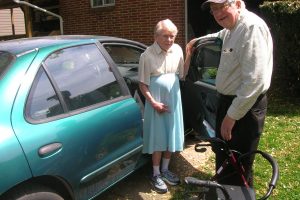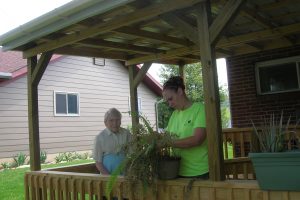We all at least hope to get old. And, when this happens, we usually lose some of our mental and physical abilities. This leads friends, relatives, and caretakers to view us in a new light – one that can be disconcerting.
This author (Hugh Culbertson) recently encountered health problems that slowed him down considerably. His loved ones have been very kind to him, and he greatly appreciates that. However, it has made him think deeply about the need for authentic communication. It is needed about matters that we may feel embarrassed to discuss and cannot easily articulate. Communication that is caring – and also complete and accurate – is important to express feelings and reach understanding.
(Culbertson is referring to three of the 10 aspects of Authentic Communication defined by your editor.)
In particular, he has reflected on the writings of sociologist Erving Goffman (1956) regarding the deference and demeanor implications of what we do and say. When we offer a hand to a person as she or he gets out of a car, we express, perhaps unconsciously, the fear that said person cannot get out by him/herself. Goffman calls this negative deference behavior – communicating a somewhat negative view of the person. Also, we express something positive about ourselves – that we are considerate and caring. The sociologist labels this positive demeanor behavior.
To offer help or not?
This morning, as the author (I) left for his office, my wife questioned me rather thoroughly to be sure I felt well enough to walk the two or three blocks from the parking lot to the office building. She also warned me to be home right away if I began feeling tired so she could quit worrying about me. I assured her I felt OK and did not doubt I could walk such a modest distance. At the same time, I must admit to feeling just a little irritated. In my mind at that moment, I felt like I was 30 years old. Yet she was treating me as though I was 90!! (Actually, I am just short of 78.)
And as we prepared for a recent camping trip, my son insisted on lifting every object heavier than about two-three pounds. I told him I appreciated this. But I thought to myself, “My goodness, does he really believe I am this far gone? Maybe he knows something that I don’t.”
Pitting yourself in the other’s shoes
As I viewed his behavior in context, however, I realized that he had lived with my wife and me for many years and had become accustomed to helping us in many ways large and small. Thus, his actions did not intentionally constitute negative deference behavior.
People living alone who require special care may not have such well-based empathy with their caretakers who are almost strangers. This often can make things difficult in terms of hurt feelings. Two-way authentic communication seems to be even more important between caregiver and caretaker in these circumstances.
On the trip, my son-in-law offered to back our camper onto a campsite. I appreciated this and allowed him to do so in a couple of instances. But I thought to myself, “Backing of vehicles into fairly tight spots has always been a strong point of mine. Why does he think I have lost such a basic skill?” This reaction doubtless stemmed partly from and contributed to my declining self-confidence.
Feeling competent
On the plus side, I relish my wife’s frequent requests to unscrew tight bottle caps – something I can do but she can’t. Such assignments, hardly noticed until recently, are a welcome expression of positive deference toward me.
My thinking about all this was influenced by a recent experience with a close family friend who found it hard to walk. When we went on trips together, other travel companions would go to great lengths to help him get into and out of a seat. He thanked them. But his wife told us he was unhappy about such concern. He wanted to do what he could by himself, and getting out of a car or bus seat was one such activity. His feelings stemmed from a basic human need for autonomy – for being a separate and distinct person with some control over his own life.
In the author’s recent experience, various Chinese friends with whom he worked as a professor have expressed great concern about his well-being. I could have felt they were “overdoing it,” but I did not. I realized that Chinese people have great respect, bordering on awe, for their elders. Culture helps shape the way we think, and he could hardly blame a person for behaving in line with his or her cultural heritage.
When you’re not quite independent
I have always considered myself a thoughtful person, However, when my wife and I went on some recent walks, I found it necessary to turn back mid-walk. I felt bad because I believed I was cramping her style. Yet she assured me she really doesn’t care about that – she wants to have me around as long as possible. In this case, I as the infirm person was failing to take her perspective into account.
In sum, both the infirm or elderly person and his/her companions need to understand each other in a social, psychological, and cultural context to avoid tensions and resentment. Achieving clear understanding of subtle matters that are a bit embarrassing to talk about isn’t easy. It takes work and thought. I have learned a good bit about this through my recent experience. Things were made fairly easy, of course, by a strong feeling that my wife, son, and son-in-law and other friends meant well in offering help and expressing concern. They clearly meant me no harm.
Copyright, 2016, Hugh Culbertson, Professor Emeritus, E. W. Scripps School of Journalism, Ohio University
Erving Goffman (1956). The Nature of Deference and Demeanor,” American Anthropologist 56: 473-502.
Editor’s note: I suspect there are many instances of irritation and hurt feelings between those you think need help and those whose role it is to give it. This essay raises important questions: To offer help or not to offer it? How do you do it compassionately and respectfully? How do you talk about it?
Please share your ideas.
For stories about fascinating people, click on the People Tab ion the navigation bar – or Things to Know and Do.
See Comments. Click here. Share your ideas and comments. Click here.
Related stories:
- Laughter, the best career medicine?What does a sense of humor have to do running a homeless shelter? Being a sales manager? A nursing assistant? A ballroom dance instructor? A certified archeologist? Or a mediator? A lot – if you’re Tonya Dalhaus who also parleyed it into a stint as a stand-up comic....
- Going solo – Making bread in ParisYou don’t have to be single to enjoy going solo. This Ohio wife and mother took off to Paris and went to baking school. It helps that she’s French, of course. Helps that she had an apartment there. But her solo adventure was still hard work. And a labor of...
- Traveling solo – Where is Julie now?When we last left Julie, she had just gotten back from a trip to Peru and was vowing to move to South America. First she needed to save money, learn Spanish, get a job there, and figure out what to do with her condo, current job, and belongings....
- Seeing small beauties leads to rewarding acts of kindnessWhen taking a walk, I happened upon these magenta berries – so unexpected and so beautiful. I love discovering small, unexpected gifts of nature. Then I wondered – what if I tuned in to small acts of human beauty, of kindness?...
- Being Jan Ehrlichman – Watergate and beyondIn 1976, Jan was 23, slim, blonde, athletic, a talented pianist, fresh out of Principia College. She’d had a privileged upbringing, she’d even met presidents. To use a phrase popular at the time, the world was her oyster – or should have been....
Comment(s) on On aging: caring communication counts
FlyingHighSolo.com
Celebrating special people, good ideas, and useful actionsSubscribe
Keep on top of what's new – subscribe to Flying High Solo! You'll get a brief email alerting you to new articles. (Your email is safe -- we will not share it with anyone).
What readers are saying
"amazing variety of topics"
"an intelligent, strong, creative, eclectic approach .... that we don't get a chance to read everyday"
"very cool and intelligent"
Highly Recommended
 Bella DePaulo's blog for Psychology Today, "the truth about singlism..." News, analysis, facts, and stories about being single in America
Bella DePaulo's blog for Psychology Today, "the truth about singlism..." News, analysis, facts, and stories about being single in America








Excellent article by Dr. Culbertson; they are neighbors of mine so I see them walking the dogs frequently. It has inspired me to visit them and ask him more questions regarding communication with elders especially for those of us who offer caregiving services. I always try to allow for my charges’ preferences about activities before I jump in to help, but I probably still inquire too often. So, this is good advice and I will seek more.
When aging comes we should be aware of the importance of communication.